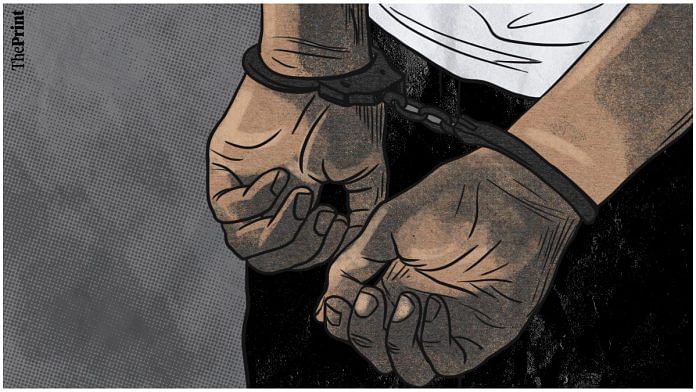New Delhi: A parliamentary panel that scrutinised the Bharatiya Nagarik Suraksha Sanhita (BNSS) — the law that seeks to replace the Code of Criminal Procedure, 1973 — has recommended that the use of handcuffs by police for arresting a person accused of ‘economic offences’ should be deleted from Clause 43 (3) of the proposed law.
This is because the term “economic offences” encompasses a wide range of offences, ranging from petty to serious, and therefore, it may not be suitable for blanket application of handcuffing in all cases falling under this category, the 28-member Standing Committee on Home Affairs headed by BJP leader Brij Lal has recommended to the government in its report on BNSS. The report was tabled in Parliament Monday.
The BNSS will replace the CrPC 1973, which regulates the procedure for arrest, investigation, inquiry, and trial of offences under the Indian Penal Code, and under any other law governing criminal offences.
Clause 43 (3) of the BNSS states that “the police officer may, keeping in view the nature and gravity of the offence, use handcuff while effecting the arrest of a person who is a habitual, repeat offender who escaped from custody, who has committed offence of organised crime, offence of terrorist act, drug-related crime, or offence of illegal possession of arms and ammunition, murder, rape, acid attack, counterfeiting of coins and currency notes, human trafficking, sexual offences against children, offences against the State, including acts endangering sovereignty, unity and integrity of India or economic offences.”
The parliamentary panel has said in its report that handcuffing, as outlined in Clause 43(3), is appropriately restricted to select heinous crimes, which is necessary for preventing the escape of individuals accused of serious offences and ensuring the safety of police officers and staff during arrests. “However, the Committee is of the view that ‘economic offences’ should not be included in this category,” the panel said.
BNSS is one of three laws that the Narendra Modi government has mooted as part of its overhaul of India’s three major criminal laws — the Indian Penal Code, 1860; The Indian Evidence Act, 1872; and the CrPc.
While the CrPC has 484 sections, BNSS has 533 clauses. The proposed law has changes in 160 sections from its predecessor, an addition of nine new sections, and the deletion of nine others.
Besides recommending the deletion of the clause on using handcuffs for arresting a person accused of ‘economic offences’, the parliamentary panel has also made several other recommendations in BNSS to the government, including empowering the Court of a Judicial Magistrate of the first class or the second class to impose community service.
Also read: 3 new Modi govt bills to replace IPC, CrPC prioritise justice over punishment, Amit Shah in LS
‘Court of judicial magistrate should be empowered to impose community service’
The BNSS bill proposes community service as one of the punishments for petty offences under Bharatiya Nagarik Suraksha Sanhita, like defamation, public servants unlawfully engaging in trade, non-appearance in response to a proclamation, and attempt to commit suicide to compel or restrain the exercise of lawful power.
The parliamentary panel has said in its report that it has reviewed Clause 23 of the BNSS and noted that in its present form, the clause does not empower the Court of a Judicial Magistrate of the first class or the second class to impose community service as a punishment.
“With respect to (the) imposition of community service as a form of punishment, the committee believes that this approach highlights that punitive actions can also encompass societal restitution and personal growth,” the report said. “The Committee also feels that it would be necessary and appropriate to award the power to impose this form of punishment, to the Court of a Judicial Magistrate of the first class or the second class.”
The parliamentary panel, which undertook a detailed examination of the text of each clause of the bill has pointed out that the BNSS contains many typographical, cross-referencing, and grammatical errors.
“The Committee is of the view that even a single typographical, cross-referencing, or grammatical error has the potential to be misinterpreted and dilute the intent of the provision. The Committee, therefore, recommends the Ministry to rectify such errors.”
Eight members of the panel — Congress leaders Adhir Ranjan Chowdhury, Ravneet Singh Bittu, Digvijaya Singh, and P. Chidambaram, Trinamool Congress’s Derek O’ Brien and Kakoli Ghosh Dastidar, DMK’s Dayanidhi Maran and N.R. Elango — have given their dissent note on the BNSS on several clauses of the bill, the Hindi title of the bill, and its poor drafting.
In his dissent note, Chidambaram said: “The bill is another copy and paste job. It is estimated that 95 percent of the clauses has been copied and pasted from the Code of Criminal Procedure, 1973. The exercise was a wasteful exercise. If it were necessary, the opportunity has been wasted to bring about the desirable changes.”
(Edited by Uttara Ramaswamy)
Also Read: House panel okay with new criminal bill’s Hindi title, says retain adultery & unnatural sex sections



